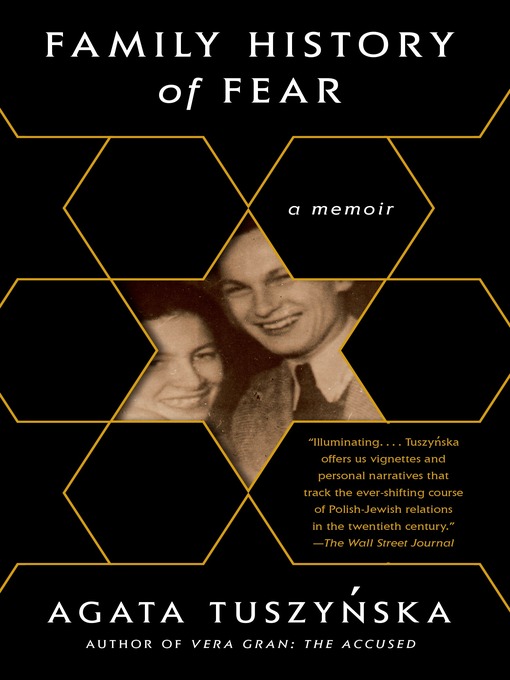Every family has its own history. Many families carry a tragic past. Like the author’s mother, many Poles did not tell their children a complete story of their wartime exploits—of the underground Home Army, the tragedy of the Warsaw Uprising, the civil war against the Communists. Years had to pass before the stories of suffering and heroism could be told.
In Family History of Fear, Agata Tuszyńska, one of Poland’s most admired poets and cultural historians, writes of the stories she heard from her mother about her secret past.
Tuszyńska, author of Vera Gran (“a book of extraordinary depth and power”—Richard Eder, The Boston Globe; “captivating”—Newsweek; “darkly absorbing, shrewd, and sharply etched”—Publishers Weekly), has written a powerful memoir about growing up after the Second World War in Communist Poland—blonde, blue-eyed, and Catholic.
The author was nineteen years old and living in Warsaw when her mother told her the truth—that she was Jewish—and began to tell her stories of the family’s secret past in Poland. Tuszyńska, who grew up in a country beset by anti-Semitism, rarely hearing the word “Jew” (only from her Polish Catholic father, and then, always in derision), was unhinged, ashamed, and humiliated. The author writes of how she skillfully erased the truth within herself, refusing to admit the existence of her other half.
In this profoundly moving and resonant book, Tuszyńska investigates her past and writes of her journey to uncover her family’s history during World War II—of her mother at age eight and her mother, entering the Warsaw Ghetto for two years as conditions grew more desperate, and finally escaping just before the uprising, and then living “hidden on the other side.” She writes of her grandfather, one of five thousand Polish soldiers taken prisoner in 1939, becoming, later, the country’s most famous radio sports announcer; and of her relatives and their mysterious pasts, as she tries to make sense of the hatred of Jews in her country. She writes of her discoveries and of her willingness to accept a radically different definition of self, reading the works of Isaac Bashevis Singer, opening up for her a world of Polish Jewry as he became her guide, and then writing about his life and work, circling her Jewish self in Lost Landscapes: In Search of Isaac Bashevis Singer and the Jews of Poland.
A beautiful and affecting book of discovery and acceptance; a searing, insightful portrait of Polish Jewish life, lived before and after Hitler’s Third Reich.
-
Creators
-
Publisher
-
Release date
May 17, 2016 -
Formats
-
OverDrive Read
- ISBN: 9781101875872
- File size: 19267 KB
-
EPUB ebook
- ISBN: 9781101875872
- File size: 25037 KB
-
-
Languages
- English
-
Reviews
-
Publisher's Weekly
March 7, 2016
Tuszyanska, a poet who grew up in Poland in the years after Hitler decimated its Jews, wrote this bleak memoir after she learned, at age 19, that she is half Jewish. Her Jewish mother was determined to hide her identity because she believed silence was safer: “You never knew when they would come after you again.” Learning all this startles Tuszyanska into a quest to discover every family member’s history, and her reporting ends up producing too much detail about too many characters. At times, her narrative has the feel of someone else’s grandmother telling you what each of the long-dead people in her black-and-white photo collection ate for breakfast. But at her best, when Tuszyanska is describing life under Hitler and her search to find the people who knew her family, she writes horror with great power in spare prose: a synagogue burns, a two-year-old Christian child is killed and Jews are accused of the murder, and a man saves her mother and grandmother from anti-Semitic bullies and then delivers them to the Gestapo. Under the piles of research, a patient and determined reader will find a tragic story about a woman’s search for identity. -
Library Journal
February 15, 2016
Author and historian Tuszynska (Vera Gran) has written a fascinating and heart-wrenching family biography. Raised in post-World War II communist Poland, blonde haired, blue-eyed, and Catholic, she discovered at 19 her Jewish heritage, but it would take her years to investigate further. Her mother survived the Nazi occupation moving among sympathetic Christian households and passing as Catholic. By not telling her daughter of her Jewish roots, the author's mother hoped to save her from the pain and fear of anti-Semitism. The book tells the stories of Tuszynska's father and his Polish-Catholic family, her mother and her Jewish family, and how her revelations changed her views of herself and her history. Photos are included throughout and an end section outlines each member of her family for easy reference. VERDICT Ably translated by Ruas, Tuszynska's story is exhilarating and liberating as she unearths long-kept secrets but also heartbreaking as she faces the anti-Semitism from which her mother tried to protect her. This compelling biography is sure to appeal to anyone interested in World War II, Poland, or Jewish history. [See Prepub Alert, 11/23/15.]--Stefanie Hollmichel, Univ. of St. Thomas Law Lib., Minneapolis
Copyright 2016 Library Journal, LLC Used with permission.
-
Formats
- OverDrive Read
- EPUB ebook
Languages
- English
Loading
Why is availability limited?
×Availability can change throughout the month based on the library's budget. You can still place a hold on the title, and your hold will be automatically filled as soon as the title is available again.
The Kindle Book format for this title is not supported on:
×Read-along ebook
×The OverDrive Read format of this ebook has professional narration that plays while you read in your browser. Learn more here.


